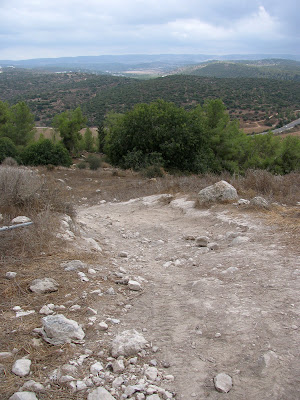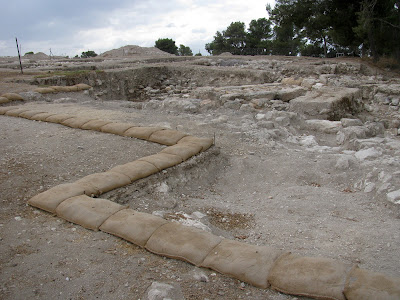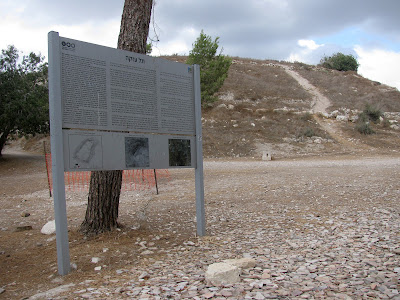Azekah is mentioned several times in the Bible. It is said to be one of the places where the Amorite kings were defeated by Joshua, and one of the places their army was destroyed by a hailstorm (Joshua 10:10–11). It was given to the tribe of Judah (Joshua 15:20). In the time of Saul, 1st Samuel 17:1 references the area around Azekah as the arena for the battle between David and Goliath.
Outside of the Bible, King Rehoboam, the first king of the Kingdom of Judah, fortified the city. It was later destroyed, together with other Judean cities, during the campaign of the Assyrian king Sennacherib. The city was rebuilt and conquered multiple times yet continued to flourish. It was populated in the Hellenistic, Roman and Byzantine periods, when it was listed in the Madaba map as Beit Zechariah. Another glorious page of Azekah's history took place in the Hasmonean period. At the top of the hill there is a large fortress built by the great Hasmonean king, John Hyrcanus I.
Despite its long occupation, Tel Azekah was eventually abandoned and forgotten. In the late 19th century it became one of the first sites to be excavated in Israel. A small team of British archaeologists briefly excavated the sites between 1898-1899 on behalf of the Palestine Exploration Fund. Due to time restrictions, the team was forced to abandon excavations and backfill their project.
A team of archaeologists returned to the site in 2012 and it is still being excavated to this day. Signs explaining the layers revealed and the various periods of history that have been uncovered can be spotted around the site.Hikers who climb up to the top of Tel Azekah are accompanied by Biblical verses that are etched on plaques, some of which describe the battle which took place nearby between David and Goliath. From the top the hill there are spectacular views overlooking the Elah Valley to the east. Tel Tzafit, which is associated with Philistine Gat, the city of Goliath, can be seen to the west and beyond is the Coastal Plain, between Tel Aviv and Ashkelon.
In the centre of the hill is a huge sundial and a stone plaza on which directions and the names of various close by settlements are engraved. Nearby long stones serve as seats for hikers, above. Verses from the Book of Samuel referencing David and Goliath and other battles with the Philistines are engraved on them. At the foot of the hill the JNF has built a picnic area.* This post has been shared on Little Things Thursday, Friday Bliss, Wordless Wednesday (on Tuesday), Our World Tuesday and My Corner of the World.













































12 comments:
So interesting to see these sites where historical events occurred!
I another wonderful tour of ancient history in Israel. Thanks for sharing!
what great views! I love all the history!!
Such amazing history. I find it particularly interesting that is took over 100 years for excavators to come back. It must have been exciting for those involved.
Such interesting sites packed with history. Great post!
You live in such an interesting place - so much history to discover. I'd love to visit one day. xx
Such interesting place! It is vertiginous to think that the ruins date back so far. I really don't know which are the most ancient ruins in Finland... Should find out. Thank you for sharing, wishing a blissful 4th Advent.
I learn so much from your little tours around Israel. Thanks for sharing with us Lisa. x
very interesting.your site is a very instructive source. thank you for sharing your erudition
In my brief visit to Israel, I never ceased to be astounded by cities and civilizations buried, then resurrected as this one has.
Thank you for sharing at http://image-in-ing.blogspot.com/2021/12/merry-christmas.html
I feel the site has so many more secrets to reveal. A very important historic site.
Remarkable the Bible stories associated with the land in which you live.
Post a Comment